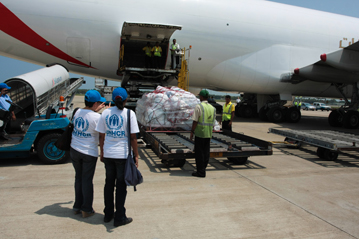UNHCR begins refugee evacuation from Liberia
UNHCR begins refugee evacuation from Liberia

MONROVIA, Liberia, July 4 (UNHCR) - A first group of more than 300 refugees to be repatriated from strife-torn Liberia in a UNHCR-organised sea evacuation operation sailed from the besieged city of Monrovia on Friday afternoon bound for Freetown, Sierra Leone. They are among thousands of refugees who have asked to be evacuated.
The UNHCR-chartered MV Overbeck arrived in Monrovia at dawn Friday, docked a few hours later, and then quickly took on board a total of 304 Sierra Leonean refugees before setting off at 3:15 p.m. local time (16:15 GMT) on the 30-hour voyage to Freetown. The first group of evacuees included several vulnerable refugees from among the tens of thousands of desperate Sierra Leoneans and displaced Liberians who fled to the Liberian capital in the wake of a rebel onslaught in early June.
Assuming the current ceasefire holds in Liberia, the 43.5-metre (143-ft.) Overbeck will shuttle between Freetown and Monrovia about every four days in a sea-borne rescue operation aimed at ferrying thousands of Sierra Leonean refugees home. In all, there were some 15,000 Sierra Leonean refugees in camps around Monrovia before the latest round of fighting, and at least 5,000 have so far indicated a desire to go home.
With the help of Liberian authorities at the port, the boarding of the ship began before 11 a.m Friday and proceeded smoothly. Port authorities helped UNHCR staff to ensure that only those on the passenger manifest boarded the Danish-built Overbeck, which has been used by UNHCR for the past five years to carry refugees and returnees throughout West Africa.
The first group of returnees had been camped at UNHCR's compound in the Liberian capital for the last three weeks. Five vehicles, including two European Union trucks, were used to ferry the refugees from the UNHCR compound to the port. UNHCR's own vehicles have been stolen or vandalised in the latest unrest. As vehicles ferried the first group of refugees from the UNHCR compound in the Mamba Point area of Monrovia to the port, scores of Liberian youths waving American flags held a demonstration near the U.S. Embassy.
Weather conditions permitting, the Overbeck is expected in Freetown early Sunday morning. It should be back in Monrovia by Tuesday to pick up more refugees. If the ceasefire in Liberia continues to hold, UNHCR will continue the rescue operation until all Sierra Leonean refugees who wish to return home have been assisted.
UNHCR's more than 30 national staff in Monrovia are now capitalising on the calm which is slowly returning to the capital to register refugees for repatriation. There are several groups of refugees scattered throughout the West African coastal city, living alongside displaced Liberians in public buildings such as schools and churches. But the humanitarian needs in the city are enormous, and UNHCR has lost much of its logistical capacity.
"Like the local population, the refugees are living in abysmal conditions and our staff are finding it extremely difficult to help them," UNHCR spokesman Ron Redmond told reporters in Geneva on Friday. "UNHCR's warehouses have been looted, our vehicles have been stolen and vandalised, fuel is in short supply, communications are difficult and security remains a real problem. UNHCR's warehouses had contained tons of blankets, mattresses, kitchenware, food, medical supplies, generators and other items for up to 90,000 people. All of it has been looted. We can only hope it has reached those who most need it."
On Thursday, one of the agency's staff went to the nearby Samukai camp, 13 km from Monrovia, to sign up refugees who want to return home. The camp of 3,800 is intact and was not directly affected by the latest round of fighting. However, like tens of thousands of displaced Liberians and refugees elsewhere in the Monrovia area, the Samukai refugees have not received any aid for several weeks. Many of the refugees told UNHCR that they wanted to go home to Sierra Leone.
UNHCR staff will also be visiting refugees living in public buildings, embassies and various other international compounds around Monrovia. Many are from camps such as VOA and Banjor, two of the four main refugee sites in the Monrovia area. These camps have been empty since early June when a flare-up in fighting between government troops and the rebel group, Liberians United for Reconciliation and Democracy (LURD), sent the frightened refugees fleeing for the comparative safety of the capital. Refugees have, however, begun to trickle back to the deserted VOA camp.
Some shops and supermarkets in Monrovia have re-opened. One bank which operates a money transfer service opened its doors on Monday, allowing many Liberians to receive cash from their relatives abroad.
Meanwhile, an increasing number of refugee arrivals from Liberia are being reported in other West African countries. UNHCR appealed to governments in the region to receive these new arrivals and to recognise that after so many years of war, just about everyone in Liberia is suffering.
In Ghana, UNHCR staff report that several vessels from Liberia, ranging from small fishing boats to larger ships, began arriving in June and are now showing up with increasing frequency.
In south-western Côte d'Ivoire, more than 30,000 Liberians, Ivorians and others have arrived from Liberia's southern Maryland County in the past month alone. In all, UNHCR estimates that Côte d'Ivoire is still hosting more than 50,000 refugees.









